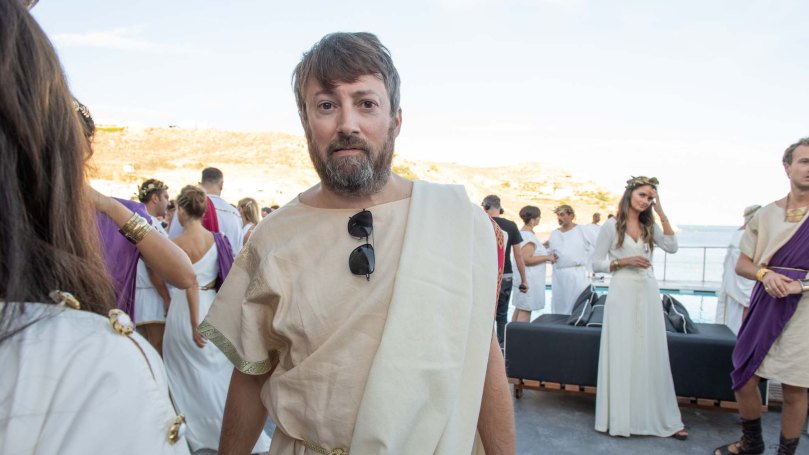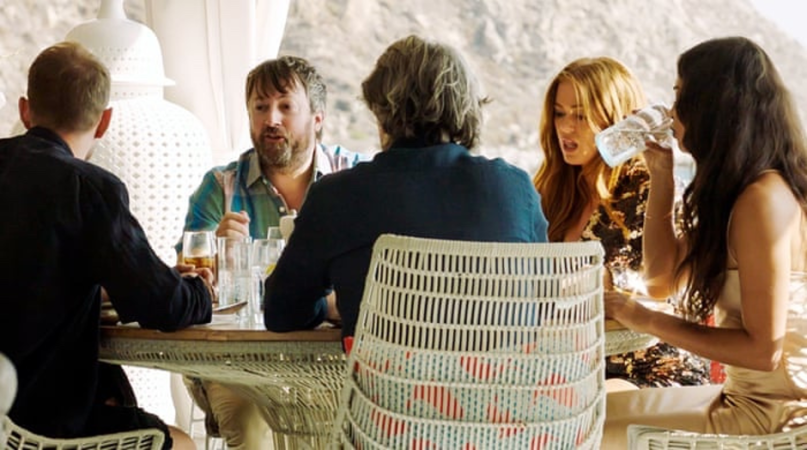
This review contains spoilers for the ending.
Steve Coogan plays Sir Richard McCreadie, the billionaire businessman who made his millions in the fashion industry, buying and selling ailing clothing stores. His reputation took a tumble when he was hauled before an MPs’ Commons Committee over his dubious practices. In order to ‘re-brand’ he decides to throw an extravagant Roman themed 60th Birthday party for himself, and hires Nick, (David Mitchell) to write a biography (which is really intended to be more of a hagiography) that chronicles his life. Unfortunately for Coogan’s McCreadie, things don’t quite go according to plan.
It’s not exactly a secret that McCreadie is a parody of fashion tycoon, Phillip Green. Just like Green, McCreadie has a long list of businesses that he’s bought and sold, even in one of the flashback scenes to the Commons Inquiry we see McCreadie tell a member of the panel to stop staring at him, just as Phillip Green infamously did at his Inquiry. The whole concept of the film itself is based around Phillip Green’s own £5 million birthday bash back in 2002, where all attendees were made to wear togas and were flown to Cyprus for the extravagant party. Here it’s Mykonos and the party goers are indeed asked/forced to wear togas.
‘You’re just dressed as his slave, you’re not his actual slave,’ David’s Nick tells Amanda, one of McCreadie’s team with a mysterious past (played by Dinita Gohil), but both remain suitably unconvinced. Their quite charming relationship is the highlight of the film as they share a common bond, being perhaps the only two people around McCreadie that feel truly uncomfortable with what they’re involved with. They represent the audience’s feelings, as the film’s true protagonist is actually the antagonist, yet that doesn’t mean McCreadie doesn’t get laughs.

Told in mockumentary style flashbacks, we see Coogan’s McCreadie making his way in the fashion world and declaring his shops ‘dreadful’ using various obscenities. Particularly amusing is when he decides he wants his entire shop decked out in bright fuchsia. Steve Coogan gives this performance his all, riffing much like he does on The Trip, his other vehicle with director, Michael Winterbottom.
Is there any sympathy for the devil? Well, no. Although we get a glimpse of McCreadie’s school days, and in one scene he’s beaten by a teacher, because he’s always had a gift for managing to get things to go his own way through his sheer ruthlessness, he makes for an almost entirely unsympathetic character. As his life story is explained we find that he made all his money in the Casinos and is something of a low-key magician. His underhand card tricks are shown later in the film, as he proposes a wager with a group of migrants that he’s keen to clear from the beach where his party is being held.

There are many guest stars in this film, including a particularly funny gag featuring James Blunt. There’s a posthumous appearance from Caroline Flack, to whom the film is dedicated. She appears very briefly to hand McCreadie a giant novelty check. Other celebrities appear to send themselves up, such as Stephen Fry, and in small blink-and-you-miss-them cameos, we see Fatboy Slim, Chris Martin and even Louis Walsh. In true ‘Extras’ style (Ricky Gervais’s star-studded sitcom) you’re never wholly convinced if these cameos are really doing the celebrity any favours.
In the excerpt from this Guardian interview, Michael Winterbottom describes the intention behind these cameos:
‘Colin Firth, Keira Knightley and Stephen Fry – give meta-cameos in Greed, paying grisly lip service to Coogan’s mogul. This, says Winterbottom, was to highlight the symbiosis between the famous and the filthy rich; the glamour bestowed by association and the confusion this creates for the consumer, who’ll think of an A-lister when buying a frock, rather than the woman in the mud hut who made it.’

There’s also a subplot featuring Made in Chelsea’s Ollie Locke (someone who had previous connections to Phillip Green’s family) throwing a spotlight on the confused reality of faked reality TV (if you follow). Although these celebrity cameos seem a bit random on a cast list, they work well. In one scene, there’s a walk on from Keith Richards (or possibly a lookalike) that perfectly alleviates the tension in an otherwise dramatic moment.
One of the more major supporting roles comes from the fantastic, Tim Key, his anger at the Greek builders who are failing to finish McCreadie’s Roman Coliseum stage set in time for the party is played for laughs initially, but eventually he has a moment of realisation when he sees one of the workers skillfully painting the fake brickwork for whatever pittance he’s being paid.
Low wages; poverty; poor working conditions; and the migrant crisis are huge topics in Greed. For a film billed primarily as a comedy, it’s actually the serious moments that have the most impact. Amanda’s backstory reveal draws parallels with the tragic 2013 Dhaka garment factory collapse. In one scene where Nick is gathering material for his book, we get an in-depth and brilliant explanation of McCreadie’s business practice, explaining in great detail an asset stripping business model, which is used by a lot of tycoons to make money. It’s quite an eye-opener, Nick is, once again, the voice of the audience, as he proclaims how unfair it all is.

It’s a brilliant performance from David Mitchell, whose Nick is both charming and funny, while he bumbles his way into a world that he’s quite clueless about.
‘I could call the book, The Lion, The Witch and the Wardrobe,’ he declares merrily to McCreadie’s family. ‘Not that you’re all witches obviously,’ he awkwardly adds to McCreadie’s ex-wife and mother (played by Isla Fisher and Shirley Henderson).
The lion Nick is referring to had been hired for the party to mill around the Coliseum as a grand centrepiece to the evening’s entertainment. Asim Chaudhry has a small role as the lion’s keeper. McCreadie, who had been regularly visiting this lion to antagonise it, meets a sticky end when the lion finally comes out of his cage…
Following McCreadie’s death, Nick finishes his book and appears on BBC news to talk about McCreadie. Other movies may have done a ‘Love Actually’ moment here, where, in the style of Hugh Grant’s PM, Nick would suddenly tell the audience the truth of McCreadie’s dirty business practices and the human cost. But, this isn’t a rom-com, this is a film basing itself in the real world. Nick’s got a job to do, after all, he’s just a writer, trying to get by himself. Nick’s agent rings him to tell him the money that he’s being paid to write the book has rocketed up since McCreadie’s death.
‘Has it?’ Nick asks somewhat gloomily with a mouthful of cereal. His agent urges him to take it, despite Nick’s reluctance to do so.
‘200K? That’s a lot of Sugar Puffs,’ he tells him.
‘Actually, I’m eating Rice Crispies,’ Nick replies.
The movie’s end credits were originally intended to name and shame real businesses, but Sony vetoed it. This caused a six-month-long battle between Michael Winterbottom and the studio, which you can read more about here.

Instead, the credits now tell us some general shocking statistics, such as how just a few individuals own as much wealth as the poorest half of the world’s population. Despite the censoring, Greed gets its message across, and leaves you thinking about it a long time after you walk out of the cinema – food for thought indeed.
